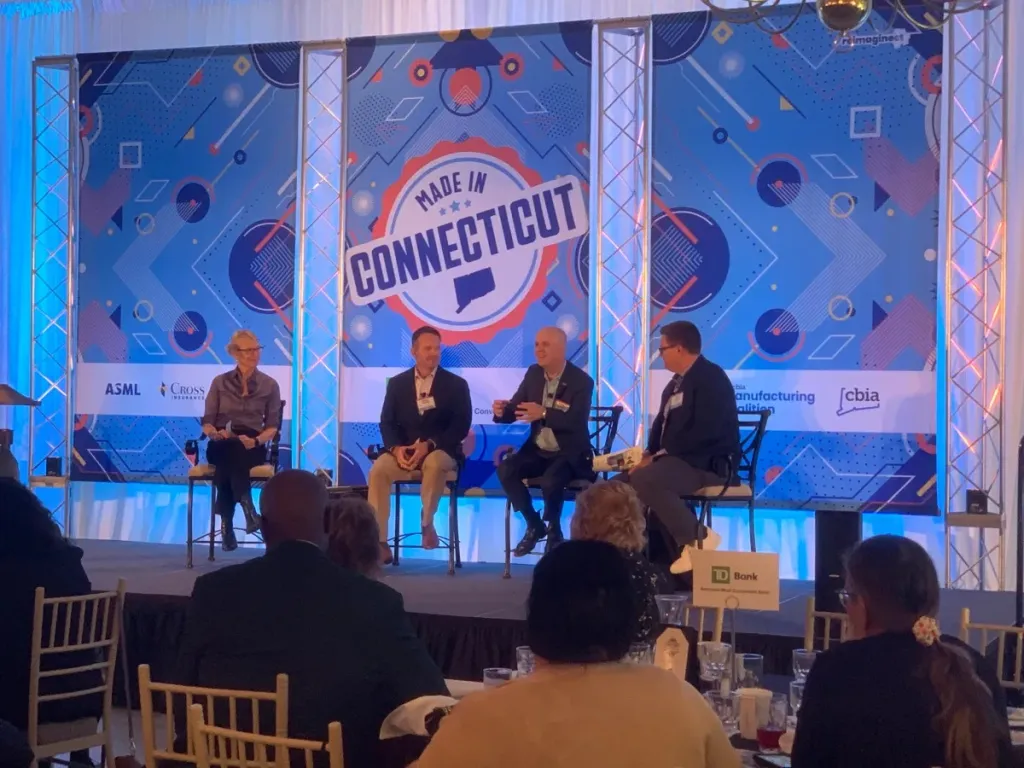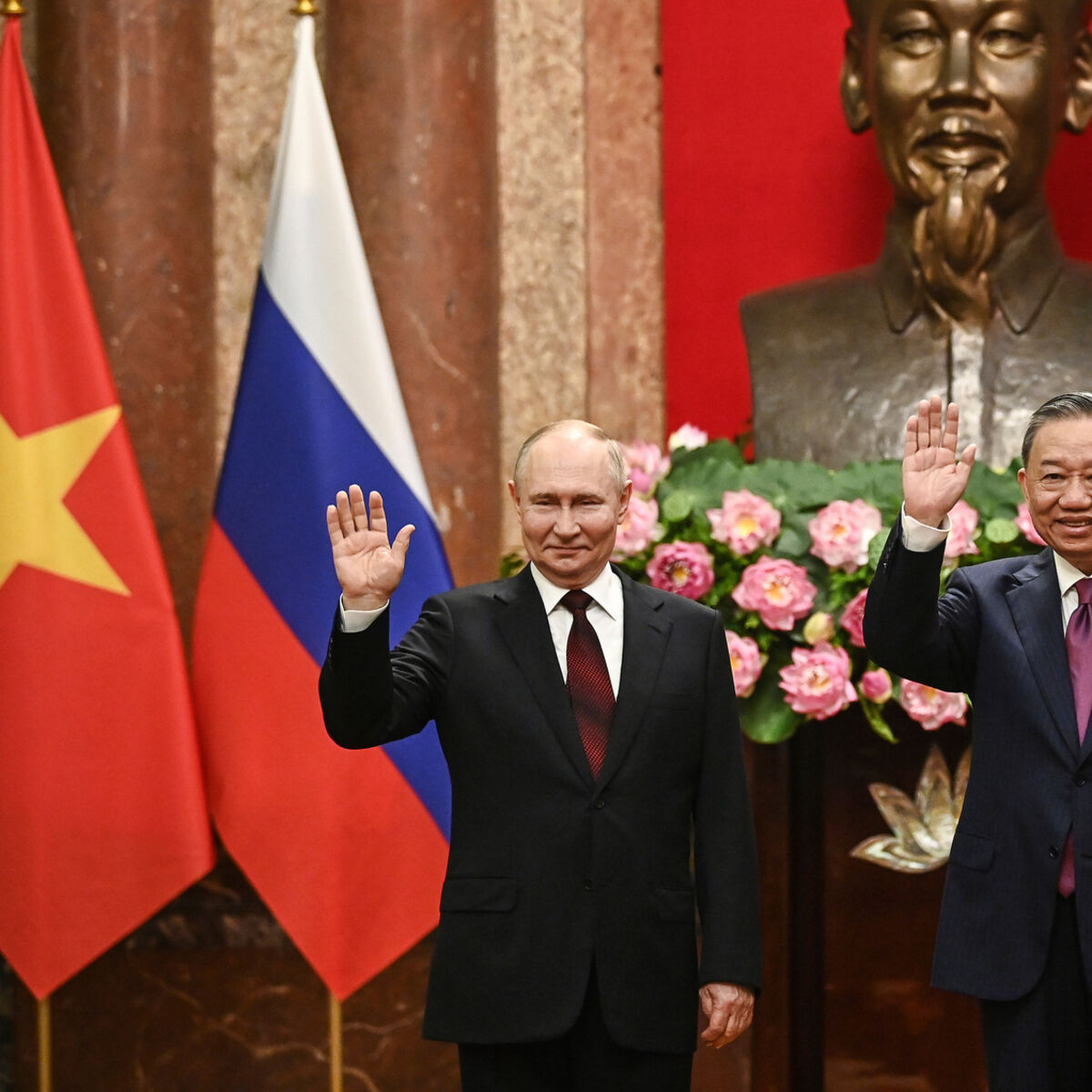
With a shifting international trade landscape and unexpected federal policy announcements, tariffs are top of mind for Connecticut’s manufacturing sector. As the state’s manufacturing community gathered this week, business owners and executives said federal policy changes are adding uncertainty to an already complex business environment.
Hundreds of those business leaders turned out for the annual Made in Connecticut: 2025 Manufacturing Summit, hosted by the Connecticut Business and Industry Association, the state’s largest trade group. The event served as part celebration and part brainstorming session, with speakers noting that while the manufacturing industry is still seeing some growth and strong profits, that success is offset by job losses and other challenges.
In the past several decades, Connecticut manufacturers have been frustrated in their efforts to attract a skilled workforce and state support while jobs and output rose in sectors like healthcare, education and insurance. Recently, large shifts in federal policy have further complicated the landscape.
Those hurdles have prompted some adjustments in how Connecticut officials view progress. Last year, Gov. Ned Lamont pivoted away from calling for manufacturing job growth, instead urging companies to focus on boosting productivity — as new tools like AI, automation, and robotics play a larger role.
National trade policy complicates operations
In recent months, the Trump administration has pursued sweeping tariffs, raising import taxes on goods brought in from numerous countries. The tariffs, the administration argues, will ultimately help American manufacturers by igniting increased domestic production to replace items that were previously imported.
Some countries have responded with their own retaliatory tariffs on U.S. products, making it harder for U.S. producers to send goods overseas and — in the case of some agricultural products like soybeans — shutting down exports almost entirely. These policies have strained tensions with countries like China, Mexico, and Canada — some of Connecticut’s strongest export and trading partners.
Speakers at the summit noted that the frequent shifts in tariff policies this year have been difficult for some local manufacturers to navigate, in part because the new taxes have often been introduced with little warning.
“We need more of a flow of information between industry and the administration before tariffs go into effect,” said John Murphy, a senior vice president and head of international trade policy for the U.S. Chamber of Commerce.
Concerns over tariffs have been raised by manufacturers across the state. In a survey of Connecticut manufacturers CBIA released recently, 66% of manufacturers said tariffs were affecting their work negatively. Nationally, businesses have cited the recent tariffs as affecting supply chains and raising costs.
At the event, several speakers questioned whether the tariffs were necessary or beneficial. “The breadth of these tariffs is broader than it needs to be, than it should be,” Murphy said.
With new tariffs on imported furniture and other items set to go into effect this month, there’s little indication that the administration intends to back down from its strategy.
That’s left some manufacturers frustrated, with speakers suggesting the tariffs could be blunting the impact of other pro-business actions taken by the administration in recent months.
“Somebody can say, ‘Oh, it’s just short-term pain for long-term gain,’” said Martin Baumann, president of ARBURG Inc., a manufacturer of plastic processing machines. “But the short-term pain is real, and I don’t think it’s that short-term.”
In 2025, CT manufacturers are seeing growth – and facing headwinds
Connecticut’s manufacturing industry is also looking to reinvent itself and reverse declines that were intensified by the pandemic. So far, the industry has only recovered 39% of the manufacturing jobs lost during the pandemic, according to the report. And in the past year — between September 2024 and August 2025 — the sector lost 1,800 jobs.
Currently, there are 4,591 manufacturing companies in the state according to the manufacturing survey. The majority are classified as small businesses, a category spanning companies with fewer than 50 employees to those with as many as 500. In total, the sector employs some 153,600 people in the state.
Manufacturing is still a significant part of the Connecticut economy: In 2024 manufacturing accounted for 11.6% of the state’s GDP. Connecticut ranked 27th nationally and second in the New England region for exports.
And many businesses are having financial success, 70% of surveyed firms turned a profit last year, while another 14% broke even. The remaining 16% reported losses.
Even so, profits alone don’t tell a complete story of the state of local manufacturing. According to the survey, 82% of manufacturers are having difficulty with worker recruitment and retention. And nearly all said they are also dealing with rising costs.
“This year’s report highlights both the enduring strengths and the pressing challenges facing Connecticut manufacturing,” Chris DiPentima, CBIA’s president, said in a press release. “Manufacturers are growing despite navigating numerous headwinds including increased labor, healthcare, and energy costs.”
Many of the findings of the manufacturing survey echo concerns previously raised by the broader Connecticut businesses community. In September, a separate survey from CBIA found that employers in all sectors were facing a challenging trifecta of labor woes, rising costs and uncertainty due to federal policy.
With so many shared concerns, Connecticut’s manufacturers are proposing a shared solution: collaboration and investment in initiatives aimed at bringing companies together. One such effort, the CBIA Manufacturing Coalition, was formally announced.
The hope, supporters say, is that Connecticut’s manufacturers will build something together that they can’t accomplish alone.
Beatriz Gutierrez, head of manufacturing consultancy CONNSTEP, said, “Amid ongoing labor shortages and supply chain uncertainty, it is strong partnerships like these that will give manufacturers the tools and voice to position the industry to grow and thrive.”
P.R. Lockhart is a reporter for the Connecticut Mirror. Copyright 2025 @ CT Mirror (ctmirror.org).



